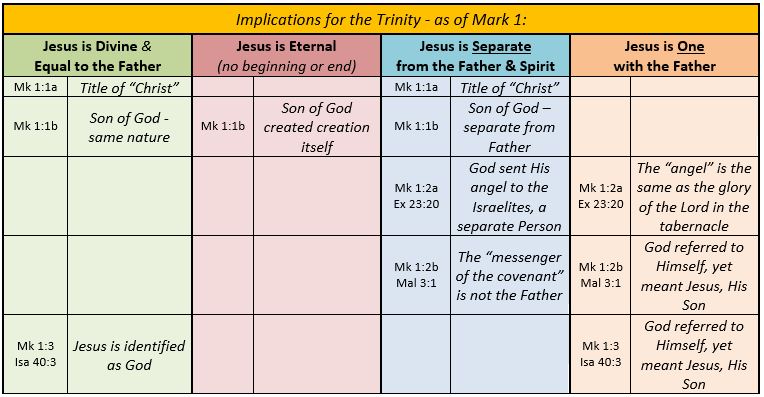God's Highway & the Trinity (Mark 1:3)
Image

Read the series so far.
God can speak about Himself, yet actually be referring to His eternal Son, Jesus. This speaks to both a oneness between Divine Persons and a clear distinction. Oneness, because one can refer to the other as Himself. Distinction, because, when this is worked out in the pages of Scripture, each Person is clearly differentiated from the another.
This is the case in our passage today—Mark 1:3. John Mark is continuing right along, explaining that the beginning of the Gospel about Jesus Christ came about just as it has been written by the prophets (Mk 1:1). How so, Mark? Three reasons:
- God said He would send His messenger to lead the way, to blaze the trail which will lead His elect people to the Promised Land (Ex 23:20; cf. Mk 1:2). Under the influence of the Spirit, Mark applied this typologically to Jesus Christ, who came to lead sinners out of this present, evil world to the Promised Land to be with the Father forever (cf. Heb 3-4).1
- Malachi wrote that God would send His messenger to prepare the way for Him (Mal 3:1; cf. Mk 1:2). That messenger is John the Baptist. He came to prepare God’s covenant people to accept and receive the Messianic King who had been promised so long ago. Yahweh said He would come, yet Jesus of Nazareth was the one sent.
- The third reason why the Good News began just as it has been written is … our passage today!
Each of these passages have implications for the doctrine of the Trinity. To be sure, some arguments are weightier than others, but their cumulative mass is impressive and persuasive. Consider our text, the third quotation which Mark grafted into one staccato burst:
the voice of one shouting in the wilderness, “Prepare the way for the Lord, make his paths straight.” (Mark 1:3)
What’s Going On?
You won’t figure out what this has to do with “the beginning of the Gospel about Jesus Christ” until you understand the context of the quotation. This is from Isaiah 40:3. In that passage, the prophet speaks about Yahweh’s glorious return to Jerusalem after the exile. It is a beautiful passage, perhaps one of the loveliest in the Scriptures. “Comfort, comfort my people,” God commands (Isa 40:1), and Isaiah did just that.
Israel will indeed pay double for her sins, but the Lord has not forsaken her—“her punishment is completed” (Isa 40:2). A voice cries out, commanding the Israelites to clear a path for Yahweh, to construct a desert highway for “our” God. This indicates the man with the voice will be an Israelite. Every valley will be elevated and every hill must be leveled. The glory of Yahweh will shine forth, and all people will see it (Isa 40:5).
A herald is commanded to go atop the highest mountain and shout to the towns of Judah, “Here is your God!” (Isa 40:9).
Look, the sovereign LORD comes as a victorious warrior; his military power establishes his rule. Look, his reward is with him; his prize goes before him. Like a shepherd he tends his flock; he gathers up the lambs with his arm; he carries them close to his heart; he leads the ewes along (Isaiah 40:10-11).
What a moving picture! Yahweh Himself2 will come in triumph. He will destroy all enemies and establish His kingdom. He will gather up His elect people in His arms, close to His heart, as He marches to the Holy Land along the highway His people have prepared for Him.
This passage is clearly about God’s promise to restore and establish His kingdom among His chosen people. He will come. He will gather His sheep. He will be a victorious conqueror.
What About Jesus?
What hath this to do with Jesus? It’s very simple, really:
- The voice crying in the wilderness is John the Baptist
- The people who are commanded to prepare the way for Yahweh are the Israelites, His covenant people
- Yahweh, however … is Jesus of Nazareth
Mark quotes the LXX almost exactly; though he substitutes “his way” for “our God’s way.” It is Yahweh Himself who was supposed to come. Isaiah used the Divine Name, the LXX translated this as “Lord” (τὴν ὁδὸν κυρίου), and Mark did the same thing. Our English translations usually capitalize the Divine Name (“LORD”) to help us spot it.3
John knew he was the prophetic “voice” whom Isaiah wrote about (John 1:23, “I am”). He commanded people to repent and to prove that repentance (Lk 3:8). In essence, he commanded people to make a straight path for the Lord into their hearts, souls and minds4—because the promised Messiah and Christ had arrived. This “way” was not wrought by empty, external obedience to the letter of the law, but its spirit. Love God with everything you have, and therefore follow the law because you love Him (cf. Deut 7:9, Jn 14:15), and thus prepare yourselves to accept and joyously receive the promised Savior!
If Yahweh Himself was supposed to come, what does it mean that Jesus of Nazareth came, instead?
- Oneness. It means God is one. Yahweh was coming and yet Jesus came. God cannot lie. He did come, fully and completely, in the Person of Jesus of Nazareth. If you see Jesus, you have seen the Father (cf. Jn 12:44-45, 14:7,9; Col 1:15; Heb 1:3).
- Divinity & Equality. It also means Jesus is divine and equal with the Father. If he can be equated to the Father and fully act as the Father, then He is equal to the Father. Yahweh said He would come, yet Jesus came. Jesus is Yahweh. This is especially important in light of the passages which clearly differentiate Father and Son—and one of these is coming right up (Mk 1:10-11).
Remember our working definition:
Within the one Being that is God, there exists eternally three co-equal and co-eternal persons, namely, the Father, the Son and the Holy Spirit.5
You cannot differentiate the Divine Persons so as to make Him into three separate Gods. Nor can you collapse the distinction between Divine Persons and create a Unitarian deity. The entire testimony of Scripture is like a diamond with many facets; one verse catches the light and emphasizes His oneness, while if you tilt your head ever so slightly, another verse heralds the true distinction between Father, Son and Spirit. Both are true. To deny one is to blaspheme the other.
Hold these distinctions in mind as you consider what we’ve learned about Jesus Christ and the Trinity just from the first few verses of Mark’s Gospel:

Jesus is one with the Father, but He is also more than that. He is the One who baptizes believers into the New Covenant by the Holy Spirit (Mk 1:8). He is the One who is distinct from Father and Spirit; the One whom God spoke to from heaven (Mk 1:10-11). He is the One the Spirit drove into the wilderness, who withstood the temptation and testing from Satan which Adam could not. He is the One who did not preach His own kingdom, but God’s (Mk 1:15).
“To whom can you compare me? Whom do I resemble?” says the Holy One (Isa 40:25). There is no one. Praise God!
Notes
1 “The combination of fulfillment texts echoes not only the exodus from Egypt, God’s greatest act of redemption in the OT, but Isaiah’s prophetic vision for a new and more glorious exodus, when God will restore his people and dwell with them,” (Mark L. Strauss, Mark, in Zondervan Exegetical Commentary on the New Testament [Grand Rapids, MI: 2014], 63).
2 Note the Divine Name, indicated by all capital letters in English translations.
3 Of the major English translations, only the NKJV did it here in Mark 1:3. Good for them.
4 “As such he must not only announce Christ’s approach and presence but also urge the people to prepare the way of the Lord, that is, by God’s grace and power to effect a complete change of mind and heart. This implies that they must make straight his paths, meaning that they must provide the Lord with a ready access into their hearts and lives. They must make straight whatever was crooked, not in line with God’s holy will,” (William Hendrickson, The Gospel of Mark [Grand Rapids, MI: Baker, 1975], 36). Italics in original.
5 This definition is from James White, The Forgotten Trinity (Minneapolis, MN: Bethany House, 1998), 26.
Tyler Robbins 2016 v2
Tyler Robbins is a bi-vocational pastor at Sleater Kinney Road Baptist Church, in Olympia WA. He also works in State government. He blogs as the Eccentric Fundamentalist.
- 79 views


Discussion